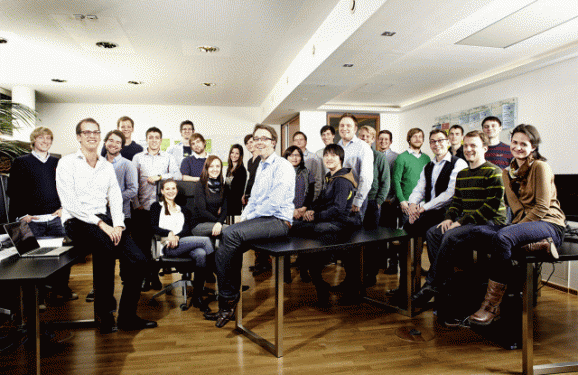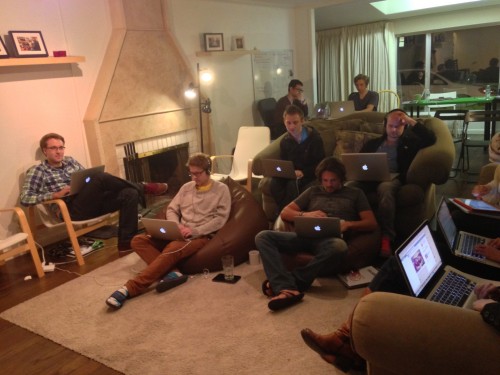When we recently wrote about Smarchive, we said that it was the stuff that dreams were made of for crowdfunding platforms: after raising money on Seedmatch, they went on to raise a 7 figure financing round with T-Ventures, Check24 and business angel Birgit Ströbel. It was one of the reasons we interviewed Seedmatch later.
But Smarchive founder Steffen Reitz said in an interview with Whiteboard that it didn’t feel like living the dream – quite on the contrary: he says getting crowdfunded on Seedmatch nearly brought it to the brink of bankruptcy.
Important to know is that Seedmatch is very different from Kickstarter. Kickstarter is a rewards based crowdfunding platform. Essentially, that means you get a t-shirt for helping a founder raise money on Kickstarter.
Seedmatch, on the other hand, is a platform to raise equity based financing, meaning that Seedmatch helps you find a big bunch of micro-investors. The people who give you money own a part of your company. There’s a big difference between someone who is entitled to a t-shirt and someone who partly owns your company, as Smarchive found out.
Steffen Reitz: “Back in the time, I thought that crowdfunding was nice and good because it gives companies in countries with little access to preseed money a chance to raise funding. But those platforms are incredibly unprofessional in terms of legal stuff.”
“When we worked with Seedmatch, they told us that crowdfunding wouldn’t cause any problems to raise money later. The truth is that their terms were completely unacceptable to our VC’s when we were raising money later. I mean, there was not one dealbreaker, there were a couple of them. There were so many things in the contract that made an exit impossible.”
“For one, the investors were not pooled. That means that we had 140 individual investors. And because there were no “drag along” or “tag along” clauses (forcing a shareholder to follow a decision made by the majority of the other shareholders, ed.), they each, individually, had the power to block a sale. Imagine: if IBM offered us a billion, one investor could stop that. It’s hard to believe that they didn’t consider that – that’s a HUGE thing.”
“There were also anti dilution clauses in the contract that were completely unacceptable to a venture capitalist. The entire contract basically made it impossible to do an exit – which, as you know, is the plan for a VC. I think these platforms are great at marketing, and Seedmatch is definitely good at that, but they don’t spend where it’s necessary – on the legal side, to get the real top lawyers working on this.”
“Looking back, it was really our fault for working with a solution where we didn’t have much examples. But at the time, it came very close to sinking us. This was at a time when we were no longer three guys out of university – we had 20 people on the payroll. People with mortgages and kids.”
Forced by their VC to either pool the investors or get them out of the company, Steffen Reitz spent weeks on the phone trying to contact all his 140 investors (who can invest as little as a few hundres of euros) individually.
“Of course, this takes weeks. I had to get them all to agree to either being paid out and receive a bonus, or to be pooled. All the time, our cash reserves were running dangerously low. It was the most frustrating time in our company: we were burning cash at an alarming rate, we had great investors lined up, but we couldn’t sign them because of that crowdfunding contract. Our VC frankly didn’t believe that we’d get the investors convinced to get out of the contract. I came very close to jumping in the car and visiting every single one of them to tell them: if you don’t sign this, we’ll go bankrupt.”
The biggest disappointment he had with Seedmatch, he says, is that despite his problems with their model, they haven’t taken steps to remedy this. “They continued with the same contract for months. I heard they did a big change recently.”
For the investors, the contracts are equally disastrous, says Reitz. “It seems to protect them in the short run, but long term, it just prevents teams from getting follow up funding. Investors in Smarchive came very close to losing their investment, because of Seedmatch’s terms. Of course, VC term sheets seem very harsh – no anti-dilution clauses, tag along, drag along, liquidation preferences. And individual investors probably balk at that. But that’s just how VC’s work and make money. It deserves a specific and tailor made contract, not something you throw together with the cheapest lawyer you can find.”
In the end, about half the Smarchive investors found through Seedmatch agreed to be bought out to make room for a VC investment. The others agreed to be pooled and represented by a third party.
Reitz seems disappointed in how Seedmatch handled the situation. He’s reluctant to talk about it, but it’s clear that he thinks Seedmatch let Smarchive down.
We checked his story with an independent source, who wished to remain anonymous, but who confirmed that the Seedmatch terms – at least in the way they were used until a few months ago – can and do cause problems for founders when they try to find follow up funding from professional VC’s and angel investors.
Reitz: “If you don’t need a VC, and you’re just doing one round, it might be a good solution. But if you want to build a global company, and you’re putting years of energy into making that dream come true: it can be a real killer.”
Despite the hairy episode, Smarchive is now well on its way to realise its ambitions to release a semantic app that understands and organises all your paperwork, says Reitz.
They’ve come a long way since the three founders were college kids asking their parents for funding to do a semantic startup. Says Reitz: “Our first year was crazy – we thought we wanted to do something with semantic search, but we didn’t actually know very much about it. We were quite naive, come to think of it (laughs). Our parents weren’t really happy to fund us in the beginning – they thought it was a stupid idea, and that we’d just burn the money. But they did in the end because we believed so much in it.”
Later, Smarchive found angel investors and obtained a state founder’s grant – something that he’s still grateful for, he says. “That’s the great thing about Europe: we do get a lot of support from the government.”
Over time, Smarchive built a team of about twenty people in Munich. “We have a top VC on board now – Thomas Grota of T-Ventures – we have a great team of machine learning geeks and PhD’s in computer linguistics to support our semantic engine. In those two years, I think we’ve built a team that hasn’t been seen in Germany.”
“I think it might have to do with us taking a radical consumer approach. We’re also taking a very ambitious approach to the user interface and user experience – the app will be really sexy and beautiful. That makes it more attractive than to go work for a B2B startup that works on an API (laughs).”
Here’s a picture of Smarchive’s UI (vaguely reminiscent of Wunderlist, if you ask me!):
The goal of Smarchive, says Reitz, is to build an app that really understands all your documents, that knows how to classify them – and that can also tell you when your insurance policy is overdue. “We wanted to build a tech that didn’t exist. And we think we have a shot at it. In a world that’s more and more connected, that’s hugely valuable. We’re getting more and more messages, documents, e-mails every day. If you can build an app that understands any type of document, that’s immensely valuable.”
The focus of the company is on the US and Germany first, but Reitz says the algorithm behind it allows the app to train itself to learn other languages and documents fast. “If a couple of users with any kind of document give it some feedback, it would build its own rules very quickly to extract metadata. That’s the biggest differentiator with other semantic apps: we spent a lot of time building a sustainable system that scales without human intervention.”
“This is also one of the biggest lessons we learned: try to think about what the impact of your action is two or three years from now. Be as professional as you can – with your lawyers, your hires. Everything should be sustainable in the long run. That’s why I would never again raise money like we did on Seedmatch, out of a spontaneous need of cash. You need to think about the reputation of the VC, of the company you want to become.”
“We spent a long time working on the engine and on our app behind the screens, because we didn’t want to release a crappy semantic app that doesn’t work well.” This might seem in contrast with what lean startup advocates – build, release and improve as quickly as you can, but it’s not, says Reitz. “You have to think hard what your basic promise is. Think of Spotify: you can’t say that you will revolutionise streaming and then release an app that needs an ethernet connection. For Spotify to amaze, it needs to work great on WiFi too. So you have to get that right before releasing it. If it’s part of the core product, then releasing it earlier would be a huge mistake.”
Reitz is currently in Silicon Valley, where he’s in the Blackbox accelerator programme. He’s not trying to move the company, he says – he’s attached to Munich. But he’s trying to grow a network among the other startups and corporations.
The experience is an eye opener, he says. “Before I came here I thought I’d find nothing here that I couldn’t find in Berlin or any other place that tries to rival Silicon Valley. But I was really wrong. There’s such a collection of talent here. And I’m constantly amazed at how fast good people will help other good people here. They’ll make time for you within a day or two. It’s not like in Germany where successful people tend to want to be left alone, or frequent only their own circles. Here, I was meeting billion dollar companies after a few introductions – it’s like an elevator that brings you up in minutes. I can never imagine that in Europe.”
“Working here is like being in the Champion’s League. I’ve never met so many incredible people. And for some reason everything here seems smooth and relaxed. Everybody’s working on the couch – they really work hard, but they just don’t make it look like working.”
Seedmatch reacts:
We called Seedmatch for a reaction.
Tim Reinsch: “It’s not untrue, what he says. But it’s only half of the story. Our contracts weren’t ideal for that situation. But consider this: these contracts made it possible for Smarchive to get where it is now. It’s true that there are no tagalong and dragalong clauses in the contract, because it has to be understandable for private investors. Too much stuff would scare them away. So yes, there was a it of an administrative effort. I think he’s dramatising a bit though – it was stressful for them and for us, but we both wanted the deal to succeed. I think the acquirer may also have been playing a part.”
You mean T-Ventures?
Reinsch: “Yes, most likely them. They had very bureaucratic and demanding expectations for how to structure the deal. We had other cases with follow on financing, business angels and public funding rounds, all based on the old contract. It has been shown to work.”
But you did change the contracts later?
Reinsch: “Yes, we also learned our lessons. The contract now has an exit clause in it, so there are no more issues as there was with Smarchive to some extent.”
Shouldn’t you have thought of that before?
Reinsch: “Think about that question. We did something completely new, online investment contract. You become a shareholder by investing on the internet – this is very complex to prepare and set up. There are many more things that we have thought of beforehand, but you have to makecompromises. But you cannot prepare for everything.”
Exit clauses are typically very important for VC’s. Surely you knew that?
Reinsch: “These are the common catchphrases, but this is a completely new way of funding. Yes, we were missing an exit clause, but on the other hand investors also couldn’t get diluted. You can argue whether the one or the other is better – now we have an exit clause in the contract, but that also brings possible dilution. It’s not like we forgot – it was a choice.”
Have there been other companies affected by the old contracts?
Reinsch: “No. We had several successful follow up funding, as well as parallel public funding with the crowdfunding. Look, we’re talking about a time frame of just over a year. Startup investments take place over years, before you can say whether it worked or not. The problem with these issues is that you have to put them in perspective, time wise and context. You can’t compare apples and oranges.”
Well, if VC’s ask apples, you have to offer them apples.
Reinsch: “I agree, and that’s one of the many reasons we changed the contracts.”
So Smarchive had to pay a price for being early adopters?
Reinsch: “No, I wouldn’t say it like that. If it weren’t for us, they wouldn’t have gotten there. I think they will admit that. You have to put it in perspective. In the end it worked out really well for them.”
UPDATE: corrected for spelling of Steffen Reitz’ name
[Photos: Steffen Reitz]
Read the article : http://www.whiteboardmag.com/how-crowdfunding-nearly-killed-my-company-the-smarchive-story/








